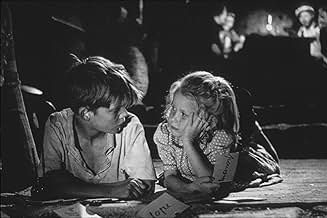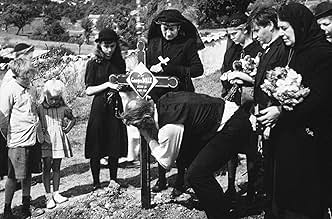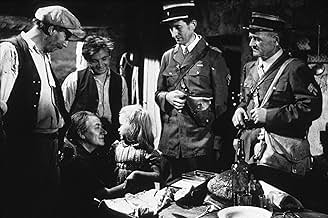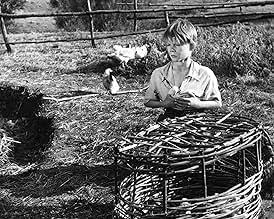Jeux interdits
- 1952
- Tous publics
- 1h 26m
IMDb RATING
8.0/10
14K
YOUR RATING
A young French girl orphaned in a German air attack is befriended by the son of a poor farmer, and together they try to come to terms with the realities of death.A young French girl orphaned in a German air attack is befriended by the son of a poor farmer, and together they try to come to terms with the realities of death.A young French girl orphaned in a German air attack is befriended by the son of a poor farmer, and together they try to come to terms with the realities of death.
- Nominated for 1 Oscar
- 8 wins & 2 nominations total
Marcel Mérovée
- Raymond Dollé
- (as Pierre Merovée)
Denise Péronne
- Jeanne Gouard
- (as Denise Perronne)
Marie-Pierre Casey
- Infirmière
- (uncredited)
André Enard
- Le premier gendarme
- (uncredited)
Marcelle Feuillade
- La mère de Paulette
- (uncredited)
Roger Fossey
- Le père de Paulette
- (uncredited)
Featured reviews
10Jack-151
This is very nearly a perfect film. There have been many films about children, but few are strong enough to allow for innocence and honesty to co-exist. Jeux Interdits (Forbidden Games) makes no such compromises. Hollywood would have traded a happy (and phony) ending for poignancy. Beautiful cinematography.
Never has the world of adults seemed so utterly stupid, brutal and senseless than through the eyes of two innocent children who have to deal with pain, loss, death and war. And yet, the film is gentle, subtle, inobtrusive in its portrayal of the grown-up's follies, and refreshingly unsentimental about presenting the pain and beauty of childhood.
A masterpiece.
Few other titles come to mind in which child actors have so much to bear, and they manage it effortlessly & unforgettably.
[The only thing that bothers me is the too convincing 'acting' of the dead /?/ dog...]
A masterpiece.
Few other titles come to mind in which child actors have so much to bear, and they manage it effortlessly & unforgettably.
[The only thing that bothers me is the too convincing 'acting' of the dead /?/ dog...]
This movie is a solid reminder of how a film does not need to be graphically violent, sex- ridden, and controversy-drenched to really affect the viewer. I picked this movie up from my local library and have watched it twice in the last two days. I chose this title simply because it bore the Criterion Collection emblem on the jacket cover and I had heard nothing about the movie at all before that time.
That being said, i knew very little of what to expect nor would i be prepared for the power of this movie.
From the opening scenes, the audience is thrown into a world of chaos and terror. This world is then filtered through the eyes of Paulette, a young french girl, as she struggles to find safety and peace from the destruction and displacement of world war two. She meets a young farm-boy, Michel, with whom she instantly bonds. Michel and Paulette begin to play games (hence the title) and create worlds separate from the noise and confusion of adults. Together they search for peace within their microcosm, and, in their own way, serve as symbols for love and friendship as Michel attempts to constantly make Paulette happy and Paulette, in turn, gives Michel something his large family never has time to award him: love.
Through breathtaking cinematography and flawless acting, Forbidden Games captivates and holds that captivation for its entirety. With strong anti-war messages this film still pertains to the present and will continue to stay relevant so long we as a human race continue to make war. There will always be children that will have to somehow rationalize the seemingly unfathomable actions of adults and there will always be adults who should turn to their children to learn the simple pleasures of life ignored in the bustle of growing old.
That being said, i knew very little of what to expect nor would i be prepared for the power of this movie.
From the opening scenes, the audience is thrown into a world of chaos and terror. This world is then filtered through the eyes of Paulette, a young french girl, as she struggles to find safety and peace from the destruction and displacement of world war two. She meets a young farm-boy, Michel, with whom she instantly bonds. Michel and Paulette begin to play games (hence the title) and create worlds separate from the noise and confusion of adults. Together they search for peace within their microcosm, and, in their own way, serve as symbols for love and friendship as Michel attempts to constantly make Paulette happy and Paulette, in turn, gives Michel something his large family never has time to award him: love.
Through breathtaking cinematography and flawless acting, Forbidden Games captivates and holds that captivation for its entirety. With strong anti-war messages this film still pertains to the present and will continue to stay relevant so long we as a human race continue to make war. There will always be children that will have to somehow rationalize the seemingly unfathomable actions of adults and there will always be adults who should turn to their children to learn the simple pleasures of life ignored in the bustle of growing old.
This great film has been well-described here and elsewhere, and I don't know that there's a lot more to be said about its worth. It made a great impression on me when I first saw it in an English-dubbed version on late night TV many years ago, and it has always been a favorite of mine since then.
But it seems there's often a bit more to learn about an old favorite film. In this case, I acquired a foreign DVD edition of "Les Jeux interdits" which contained, besides some interesting outtakes, a later-deleted prologue and epilogue to the film which I had never heard of before. These did not have English subtitles, so I had to guess what was being said, but Clement's direction and the acting of young Fossey and Poujouly are so good that I could follow almost all of it without knowing very much French at all. They establish a sort of framing device for the story, in that the plot of the film is in fact a story from a book being read by the boy to the girl. In the prologue we see Fossey and Poujouly, not dressed in grimy peasant clothes at all, but clean, scrubbed, and in their Sunday-best, sitting on a log over a stream. The boy begins reading the story of Paulette and Michel out of the book, and we fade into the film as we now know it, beginning with the refugees on the road. After the sad ending of the story, we fade back to the epilogue, where the boy has just finished reading. The heartbreaking ending of the story has the girl in tears of despair. So the boy, in an act of kindness to her, pretends to read a blank page at the end of the book and makes up a happy ending to the story to dispel her grief.
I guess I can see why it might have been deleted later, as it tends to soften the force of the central narrative a bit and the devastating sadness of its ending. But it really is a beautiful and touching bit of film, and I'm very happy to have a chance to see it, as I don't think it's been seen much over the years, or that many fans of this film are even aware of it.
The outtakes are quite interesting as well, as they show some alternate takes of familiar scenes, including the snapping of that little blackboard thing with the title of the film at the start of the shots (what's that thing called, anyway?). There is also some footage of the old owl in the rafters of the mill, in which you can occasionally see Clement coming into the frame to turn the owl's head around toward the camera when it keeps turning away.
With or without the missing prologue and epilogue this is a great masterpiece that you should experience.
But it seems there's often a bit more to learn about an old favorite film. In this case, I acquired a foreign DVD edition of "Les Jeux interdits" which contained, besides some interesting outtakes, a later-deleted prologue and epilogue to the film which I had never heard of before. These did not have English subtitles, so I had to guess what was being said, but Clement's direction and the acting of young Fossey and Poujouly are so good that I could follow almost all of it without knowing very much French at all. They establish a sort of framing device for the story, in that the plot of the film is in fact a story from a book being read by the boy to the girl. In the prologue we see Fossey and Poujouly, not dressed in grimy peasant clothes at all, but clean, scrubbed, and in their Sunday-best, sitting on a log over a stream. The boy begins reading the story of Paulette and Michel out of the book, and we fade into the film as we now know it, beginning with the refugees on the road. After the sad ending of the story, we fade back to the epilogue, where the boy has just finished reading. The heartbreaking ending of the story has the girl in tears of despair. So the boy, in an act of kindness to her, pretends to read a blank page at the end of the book and makes up a happy ending to the story to dispel her grief.
I guess I can see why it might have been deleted later, as it tends to soften the force of the central narrative a bit and the devastating sadness of its ending. But it really is a beautiful and touching bit of film, and I'm very happy to have a chance to see it, as I don't think it's been seen much over the years, or that many fans of this film are even aware of it.
The outtakes are quite interesting as well, as they show some alternate takes of familiar scenes, including the snapping of that little blackboard thing with the title of the film at the start of the shots (what's that thing called, anyway?). There is also some footage of the old owl in the rafters of the mill, in which you can occasionally see Clement coming into the frame to turn the owl's head around toward the camera when it keeps turning away.
With or without the missing prologue and epilogue this is a great masterpiece that you should experience.
A classic French foreign film, one of the best. A necessity for every foreign film lover's video library, along with Cinema Paradiso and Life Is Beautiful. This film haunts you and stays with you long after the film flashes its "finis". Part of this is due to the musical soundtrack, with its romantic guitar melodies, part of it has to do with the sadness of the storyline....the little girl's losing her parents and beloved dog early in the picture, but mostly the film lingers in your heart because of the outstanding performances by the child actors in this film, Georges Poujouly who plays Michel, and especially Brigitte Fossey as Paulette. Her little innocent face expresses all the horrors and trauma of war, what all the millions of children must have felt who were caught up in the barbarism of World War Two, when the security of a loving home was pulled out from under them. Never has the agony of a human being's suffering been so well captured on film, and I think Brigitte was all of six years old when she performed in this movie. A remarkable feat.
Did you know
- TriviaIn a television interview ("Vivement Dimanche Prochain", France 2, 17 April 2005) Brigitte Fossey, who played the little Paulette, revealed that the film had originally been shot as a short, and then it was later decided to extend it into a feature film. Unfortunately she had lost her milk teeth and Georges Poujouly (who plays the boy Michel) had had his hair cut to play in Nous sommes tous des assassins (1952). So, in many scenes of the movie Paulette has false teeth and Michel is wearing a wig.
- GoofsThe poor parents are killed by a Focke-Wulf 190. This kind of plane didn't exist at the moment of the "battle of France" in May and June 1940.
- Crazy creditsThere are two alternate opening credits:The main credit starts with a story book and a female hand opens the book to reveal the credits. The alternate still has the same book but this time we are introduced to the two main characters who are sitting by a lake. In this version, Michel's hand is turning the page and in between the scenes he tells Paulette that he's going to tell a story.
- ConnectionsFeatured in Le ciné-club de Radio-Canada: Film présenté: Jeux interdits (1959)
- How long is Forbidden Games?Powered by Alexa
Details
- Release date
- Country of origin
- Official site
- Language
- Also known as
- Croix en Bois, Croix en Fer
- Filming locations
- Production companies
- See more company credits at IMDbPro
Box office
- Gross US & Canada
- $33,284
- Opening weekend US & Canada
- $4,316
- Apr 26, 2015
- Gross worldwide
- $33,897
- Runtime
- 1h 26m(86 min)
- Color
- Aspect ratio
- 1.37 : 1
Contribute to this page
Suggest an edit or add missing content















